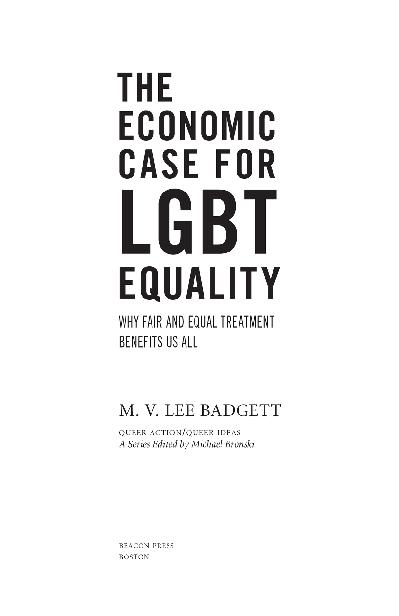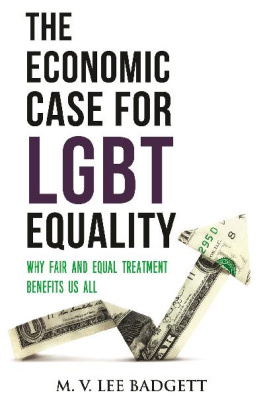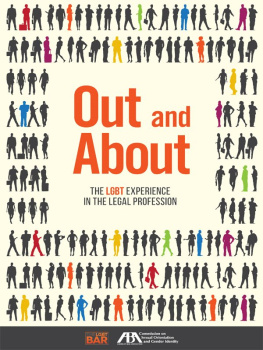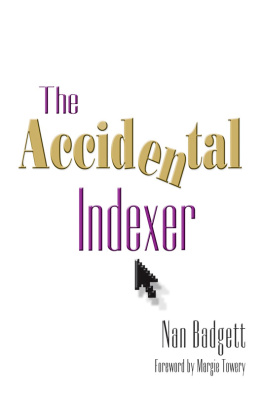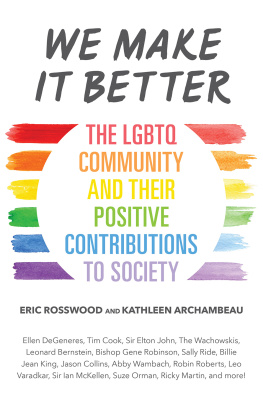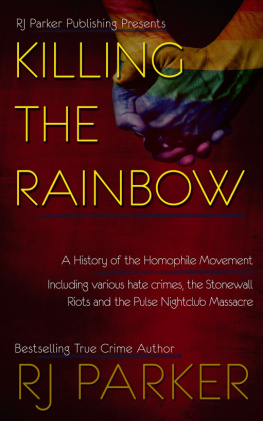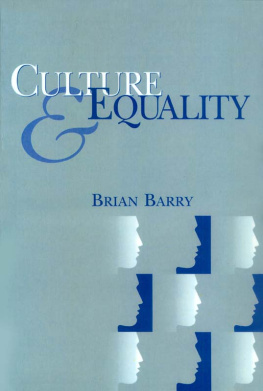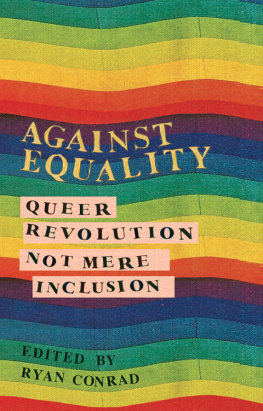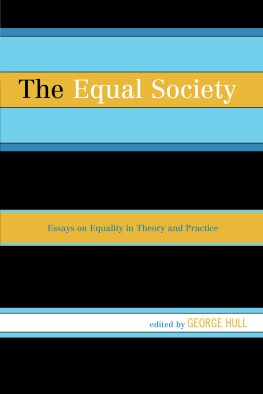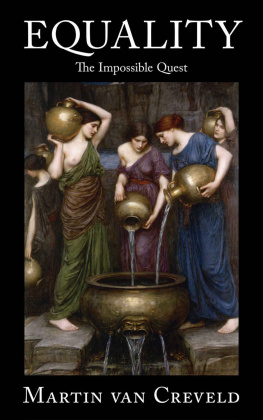PRAISE FOR
THE ECONOMIC CASE FOR LGBT EQUALITY
The denial of LGBT equality is morally wrong. Lee Badgetts superbly researched book also shows the immense economic losses that result from this inhumanity. Eye-opening in its global scope, The Economic Case for LGBT Equality is a must-read for all business leaders and policymakers.
JANET YELLEN , Distinguished Fellow, Brookings Institution
Lee Badgett is the premier economist working on LGBT issues todayand perhaps ever. In this tough-minded, far-ranging, and accessible volume, she crisply articulates the benefits of LGBT inclusion across multiple domains, including education, employment, and health. Along the way, she illuminates why advocates of LGBT rights should embrace economic arguments, which support rather than supplant their moral claims.
KENJI YOSHINO , Chief Justice Earl Warren Professor of Constitutional Law, New York University School of Law
One of the worlds leading authorities on the economics of the LGBT experience, Lee Badgett articulates the importance of granting LGBT community members full and equal participation in basic economic, education, health, social, and political settings. This well-written and impactful resource offers business leaders an in-depth analysis on the significance of driving LGBT inclusion in the workplace and marketplace.
TONY TENICELA , Global Leader, Marketplace Diversity and Workforce Engagement Services, IBM
I wish people would support LGBTQI rights because it is the moral and just thing to do, but if not, The Economic Case for LGBT Equality provides the evidence to confirm what many of us know firsthand: homophobia, transphobia, and patriarchy not only keep LGBTQI people in poverty or compensated less compared with their straight or cisgender counterparts, but they also cause entire nations to lose. When LGBTQI people cant bring their full selves into the workforce, creativity is stifled and opportunity lost. No employer can afford to lose talent, no nation can afford to lose revenue, and no person should be marginalized economically because of their sexual orientation, gender identity, or gender expression. This book has the potential to persuade even the most ambivalent that LGBTQI rights matter for everyone, and every person with power should read it.
JESSICA STERN , executive director, OutRight Action International
The Economic Case for LGBT Equality deserves to be a best seller. LGBTQI people in Uganda and around the world are often conceived as a high business risk since employers are unwilling to address cases of harassment and discrimination. As a result, not only do LGBTQI individuals lose out on important employment opportunities, but M. V. Lee Badgett shows that companies bottom lines are adversely affected as well. This articulate and convincing book for why fairness truly benefits us all should be read by all organizations, activists, and governments.
KASHA JACQUELINE NABAGESERA , queer radical feminist and founder of Freedom & Roam Uganda
QUEER ACTION/QUEER IDEAS
A UNIQUE SERIES ADDRESSING PIVOTAL ISSUES WITHIN THE LGBTQ MOVEMENT
BOOKS IN THE QUEER ACTION SERIES
Family Pride: What LGBT Families Should Know about Navigating Home, School, and Safety in Their Neighborhoods , by Michael Shelton
Out Law: What LGBT Youth Should Know about Their Legal Rights , by Lisa Keen
Come Out and Win: Organizing Yourself, Your Community, and Your World , by Sue Hyde
BOOKS IN THE QUEER IDEAS SERIES
Loves Promises: How Formal and Informal Contracts Shape All Kinds of Families , by Martha M. Ertman
Gaga Feminism: Sex, Gender, and the End of Normal , by J. Jack Halberstam
God vs. Gay? The Religious Case for Equality , by Jay Michaelson
Queer (In)Justice: The Criminalization of LGBT People in the United States , by Joey L. Mogul, Andrea J. Ritchie, and Kay Whitlock
Beyond (Straight and Gay) Marriage: Valuing All Families under the Law , by Nancy D. Polikoff
From the Closet to the Courtroom: Five LGBT Rights Lawsuits That Have Changed Our Nation , by Carlos A. Ball
At the Broken Places: A Mother and Trans Son Pick Up the Pieces , by Mary Collins and Donald Collins
The Queering of Corporate America: How Big Business Went from LGBTQ Adversary to Ally , by Carlos A. Ball
To Mr. X and Mr. Y,
and to all the other Salzburg Global
LGBT Fellows who are bearing
these costs and working to
change them for us all.
CONTENTS
AUTHORS NOTE ON LANGUAGE AND TERMS
T HIS BOOK USES some important terms in ways that might be unfamiliar to some readers, so here is a brief guide. When we talk about lesbian, gay, bisexual , and transgender people, we usually mean people who have a particular identitythey think of themselves as belonging to one of those four groups. Sometimes they are also called sexual and gender minorities as a group, since most surveys find LGBT people to constitute somewhere around 36 percent of the population in places with high quality statistics. Another umbrella term preferred by some activists is queer , which I sometimes use to refer to LGBT people broadly.
Heres another way to think about it: lesbian, gay, and bisexual people are those with a particular sexual orientation , which can also be thought of as having a romantic or sexual attraction to people of the same sex or having sex partners of the same sex. Bisexuals are attracted to or have had sexual partners from more than one gender group. Heterosexuals are attracted to and are partners with different-sex people. So sexual orientation can refer to a self-identity, an attraction, or a behavior.
Gender identity captures whether someone thinks of themselves as male or female, nonbinary, or something else. Transgender people include those who live as and think of themselves as a gender that is not the same as the sex they were assigned when they were born. Someone born male who lives as a woman would be a transgender woman. Someone born female who lives as a man would be a transgender man. Some transgender people would prefer not to use what they see as restrictive binary male-female gender labels and might call themselves genderqueer, nonbinary, third gender, or some other label. Not all nonbinary people identify as transgender, though. And transgender and nonbinary people also have sexual orientations, sometimes thinking of themselves as lesbian, gay, bisexual, or heterosexual, just as nontransgenderor cisgenderpeople do.
Its important to note that identity labels will continue to evolve over time. They also dont always line up with attraction or sex partners, especially outside the Western contexts that generated these terms and identities. Some cultures define sexual minorities with local terms that combine someones sexual partners and gender identity. For example, in India, hijra are people born as male who think of themselves as a third gender, and they generally have sex with men. In Indonesia, waria is the term used for some transgender women.
Just as there are different ways to think of LGBT people, there are also different ways of describing their inequality. Psychologist Gregory M. Herek defines stigma as societys negative view of LGBT people that assigns them an inferior social status. Sexual prejudice is the negative view of LGBT people held by individuals who have internalized that social stigma.
Discrimination is more active and happens when LGBT people are treated poorly compared to non-LGBT people, such as in hiring or in an educational setting, even when they have the same abilities or qualifications. Violence refers to actions that directly generate physical, psychological, or sexual harm to LGBT people. We could think of rights as legal or moral claims that allow LGBT people to insist on equal treatment if they face discrimination or violence.
